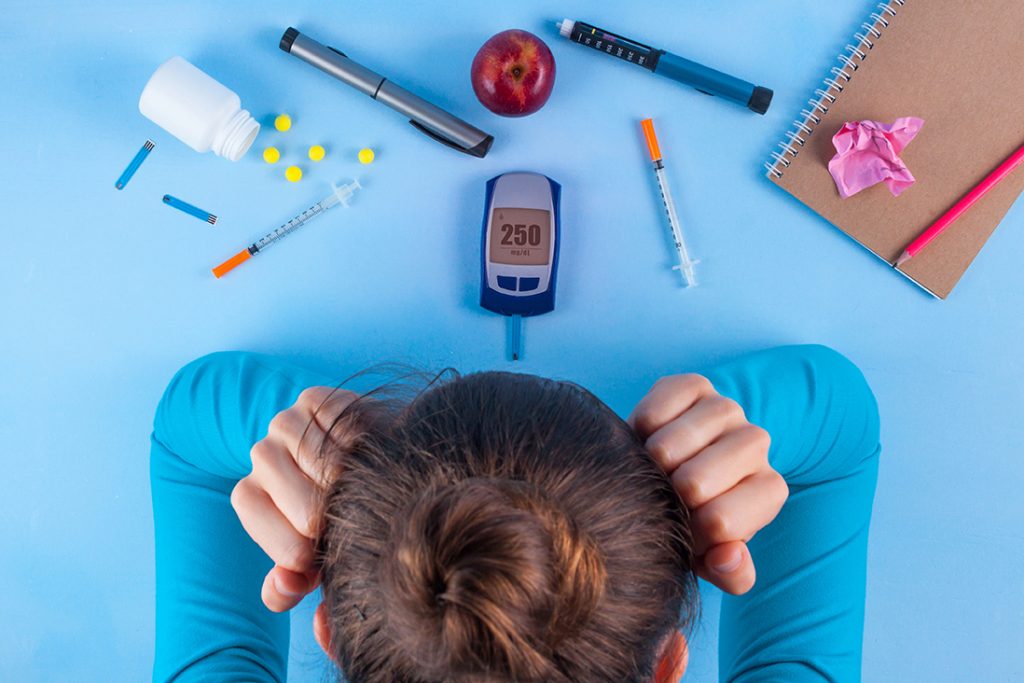Diabetes and depression are two conditions that often go hand in hand. People with diabetes are at an increased risk of developing depression, and people with depression are more likely to develop diabetes. It is important to be aware of the link between these two conditions and know how to seek help if you or someone you know is affected. In this blog post, we will discuss the link between diabetes and depression and offer advice on how to get help if you need it.
Contents
What Is Diabetes Depression? 
Diabetes depression is a condition where someone experiences both diabetes and depression. This can be a difficult condition to manage because the two conditions can worsen each other.
Depression can make it harder to stick to a diabetes treatment plan, and diabetes can cause fatigue and other physical symptoms that contribute to depression.
How Does Diabetes Result In Depression?
There are a few key ways in which diabetes may lead to depression. First, the chronic nature of diabetes can be very stressful.
Managing blood sugar levels, taking medication, and making lifestyle changes can be tough. It’s not surprising that people with diabetes are at an increased risk of developing depression.
Another way that diabetes can contribute to depression is through physical changes. Diabetes can cause nerve damage, which can lead to pain and numbness in the limbs. It can also cause sexual dysfunction and problems with vision. These physical changes can be difficult to deal with emotionally, and they can lead to feelings of depression.
Finally, diabetes can lead to financial stress. The cost of diabetes medication, supplies, and treatment can be expensive. This financial burden can add to the emotional stress of dealing with diabetes, and it can contribute to feelings of depression.
How Does Depression Result In Diabetes? 
Studies have found that people who are depressed are more likely to develop diabetes than people who are not depressed. There are a few possible explanations for this link.
People who are depressed may be less likely to take care of themselves. They may not eat healthy foods or exercise regularly. These lifestyle choices can increase the risk of developing diabetes.
In addition, depression interferes with sleep. Sleep is important for managing diabetes, but depression can make it difficult to get enough rest. This can lead to diabetes problems such as high blood sugar levels.
Third, people who are depressed may have higher levels of stress hormones. These hormones can increase the risk for diabetes by affecting the way the body metabolizes glucose.
Finally, people who are depressed may have a harder time managing diabetes. They may have trouble sticking to their treatment plan or following through with doctor’s appointments. This can result in poor diabetes control and an increased risk for complications.
What Are The Risk Elements?
Risk factors for developing diabetes include:
- Family history of diabetes
- Obesity
- Older age
- Sedentary lifestyle
- High blood pressure
- Abnormal cholesterol levels
- History of gestational diabetes
- Polycystic ovary syndrome (PCOS)
- Depression
Risk factors for developing depression include:
- Family history of depression
- Personal history of depression
- History of abuse or trauma
- chronic medical conditions
- Substance abuse
- certain medications
- Poor coping skills
The above-mentioned are some of the common risk factors for both diabetes and depression.
How Do Therapies Help?
There are a few different ways that diabetes and depression can be linked. For example, diabetes can lead to depression, or diabetes and depression may share some common risk factors. Additionally, the treatments for diabetes and depression may overlap. There are a few different ways that therapy can help manage both diabetes and depression.
Cognitive Behavioral Therapy
Cognitive behavioral therapy (CBT) is one type of therapy that can be helpful for both conditions. It can help people change negative thinking patterns and behaviors that might contribute to both diabetes and depression.
CBT is a type of psychotherapy that helps people manage their diabetes and depression. It can help people change their thoughts and behaviors related to diabetes and depression. For example, CBT can help people with diabetes who are depressed learn how to:
- Set realistic goals for managing diabetes
- Handle difficult emotions related to diabetes
- Develop healthy coping skills
- Make lifestyle changes to improve diabetes management
Exposure Therapy
Exposure therapy is a type of psychological treatment that involves exposing patients to the objects or situations that trigger their anxiety.
In the case of diabetes, exposure therapy can help patients manage their diabetes by teaching them how to cope with the stressors that trigger their diabetes. For example, if a patient’s diabetes is triggered by stress, exposure therapy can help them learn how to cope with stress healthily.
Exposure therapy can also help patients manage their depression by helping them identify and confront the negative thoughts and beliefs that contribute to their depression. For example, if a patient believes that they are worthless because they have diabetes, exposure therapy can help them confront that belief and learn to see themselves in a more positive light.
Interpersonal Therapy
IPT focuses on relationships and communication. This type of therapy can help people with depression by teaching them how to better communicate their needs to their loved ones and healthcare team. People can connect with others in a more meaningful way.
It can help people with diabetes to better manage their condition and improve their mood. For example, interpersonal therapy can teach people with diabetes how to:
– Communicate their needs to family members, friends, and healthcare providers
– Set boundaries with others
– Express their feelings in a healthy way
– Resolve conflict in relationships
Interpersonal therapy can also help people with diabetes to develop a support network of family and friends who can offer emotional and practical support.
Group Therapy
Group therapy can help manage diabetes and depression in several ways. First, it provides support from others who are going through similar experiences. This can be invaluable for both diabetes and depression, as it can be difficult to find understanding and support from family and friends who may not be able to relate to what you’re going through.
Second, group therapy allows you to share your struggles and successes with others, which can help keep you accountable and motivated.
Finally, group therapy can provide education about diabetes and depression, which can help you better understand your condition and how to best manage it.
Family Therapy
Family therapy is a type of therapy that involves meeting with a person’s family to discuss and solve problems. It helps people with diabetes by teaching them how to better communicate their needs to their loved ones. It can also be helpful for people with depression by teaching them how to connect with their loved ones in a more meaningful way.
Family therapy can help provide support, understanding, and practical advice for dealing with these conditions. It can also help families develop a plan for managing diabetes and depression and make necessary lifestyle changes.
Family therapy can be especially helpful for children and teens who have diabetes or are at risk for developing diabetes. Teens with diabetes are more likely to develop depression than their peers without diabetes, so family therapy can provide much-needed support.
Psychodynamic Therapy
Psychodynamic therapy helps manage diabetes and depression. This type of therapy focuses on helping people understand the connection between their thoughts, feelings, and behaviors.
It can help people learn to manage their diabetes by understanding how their emotions and behavior may be contributing to their condition. For example, someone who is depressed may not take care of themselves as well as they should, which can lead to diabetes.
Or, someone with diabetes may become depressed because of the physical and emotional changes that come with the condition. Either way, psychodynamic therapy can help people understand these connections and make positive changes in their lives.
So, these are some different types of therapies that can help manage diabetes and depression. If you’re struggling with both conditions, talk to your doctor about which type of therapy might be right for you.
How Do Medications Help? 
When diabetes and depression co-occur, it can be difficult to manage both conditions. Medications prescribed for diabetes may help to improve depressive symptoms. For example, Metformin has been shown to improve mood in people with diabetes and depression. Some other examples include :
- Insulin: This medication can help to regulate blood sugar levels.
- Sulfonylureas: These medications can help to increase insulin production in the body.
- Thiazolidinediones: These medications can help to improve insulin sensitivity.
If you are struggling to manage diabetes and depression, it is important to seek help from a healthcare professional. They will be able to assess your situation and provide guidance on how to best manage both conditions.
If you are taking medication for diabetes and still experiencing depressive symptoms, speak to your doctor about other treatment options that may be more effective.
How Do Lifestyle Changes Help?
Lifestyle changes make a great difference if developed in the right direction. They can directly help you achieve the desired goal. Moreover, these are purely natural methods to get a cure wherein you don’t need any medications or therapies. However, certain therapies should be supplemented with self-copying mechanisms to get proper treatment. Some useful tips in this regard include:
Eating A Healthy Diet
A healthy diet is important for managing diabetes and depression. For example, a diet rich in vegetables, fruits, whole grains, and lean proteins can help manage diabetes by keeping blood sugar levels under control. A healthy diet can also help improve mood and reduce symptoms of depression.
Getting Regular Exercise
Exercise improves mood, increases energy levels, and reduces stress. For people with diabetes, exercise can also help to control blood sugar levels. When choosing an exercise program, it is important to find one that is enjoyable and safe for your individual needs.
Maintaining A Healthy Weight
Maintaining a healthy weight is important for managing diabetes and depression. When someone is overweight, they are more likely to develop diabetes. This is because being overweight increases the amount of sugar in the blood, which can lead to diabetes. Therefore, maintaining a healthy weight is important for both managing diabetes and depression.
Quitting Smoking
Quitting smoking is one of the best things you can do for your health overall, and this is especially true if you have diabetes. Smoking cigarettes raises your blood sugar levels, which can lead to diabetes complications like heart disease, stroke, kidney disease, and nerve damage. Quitting smoking also helps improve your mood and reduces stress, both of which are important factors in managing diabetes.
Managing Stress
When diabetes and depression are both present, it can be difficult to manage both conditions. However, managing stress can help to better manage diabetes and depression. Stress management techniques such as relaxation therapy, yoga, and meditation can help to lower blood sugar levels and improve mood.
Getting Enough Sleep
When we sleep our bodies have a chance to repair any damage that has been done during the day. This means that our cells have a chance to regenerate and our immune system gets a boost.
Getting enough sleep also helps regulate our hormones, which can impact both diabetes and depression. Finally, sleep gives our brain a break from the day-to-day stressors that can trigger or worsen both conditions.
Spending Time In Nature
Studies have shown that spending time in nature can help reduce stress levels, improve moods, and increase overall well-being.
Nature has a calming effect on the mind and body, which can be helpful for those who are dealing with diabetes and depression. There are many different ways to enjoy nature, such as going for a walk in the park, hiking in the woods, or simply spending time in your backyard.
Connecting With Loved Ones
Connecting with loved ones can help manage diabetes and depression by providing practical assistance. This could involve helping with things like grocery shopping, cooking meals, or taking care of children. Having someone to help with these everyday tasks can take a big load off of someone who is already struggling to cope with their diabetes and depression.
Conclusion
Diabetes and depression are interconnected. People who have diabetes are at an increased risk for developing depression, and people who are depressed are at an increased risk for developing diabetes.
However, it is important to remember that this does not mean that all people with diabetes will develop depression or that all people who are depressed will develop diabetes. There are many factors involved in the development of both conditions, and there is still much we do not understand about the link between them.
Professional Guidance is the first step to moving toward your healing journey. You can try reaching Mantra Care to seek expert help in the comfort of your own home. Our therapists will help you get a solution to manage and overcome your problem. You can book your online therapy and talk directly to your assigned mentor. You may also download our free Android or iOS app.








